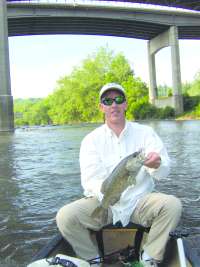When fishermen tell you that they plan to get out on the water “early,” they mean early in a very different way than, say, runners, mountain bikers or climbers.

I learned this the other day when a friend invited me to join him on a fishing trip down the French Broad River. Our roles on this trip were established from the start: I would be the complete novice, and he would be the professional angler who spends nearly every weekend scouring local waters for prize fish. But no sooner had I committed myself to joining him than I realized that “early” definitely meant “before dawn.”
Indeed, 5 a.m. came early. Since we were doing a point-to-point float from Asheville’s River District to Woodfin, we had to coordinate logistics. One car would have to be left at the put-in, the other at the takeout. That ate up some time, but we still managed to launch our canoe at first light.
I wish I could tell you that the fish—smallmouth bass (or anything else, for that matter)—were breaking the surface in their fierce desire for our lures, but the river just flowed along smoothly, unbroken, like thick oil ebbing from a tanker spill. I felt a long day coming, but figured it shouldn’t take too long to float a mere six miles. Little did I know about all the stops and starts that are involved in a day’s fishing.
My first catch was a good-sized tree, and it took a serious chunk of time to retrieve my friend’s expensive, top-water lure from the branches. I almost felt proud that I’d hooked such a big one—and right in the middle of the river, no less. My friend’s face, however, betrayed a different sentiment. He handed me another lure to try, a rubbery thing that looked vaguely like an insect. On my first cast, it flew through the wind with all the accuracy of a small chunk of dry Styrofoam. Clearly, any tree or bush standing more than 10 feet away was safe from me now.
About an hour into the trip, my friend got his first bite. He’d thrown out an anchor and was eyeing the calm water behind a string of boulders that parted the river’s flow. After about 40 more casts, we set off again. I felt a strong foreshadowing that I would see this scenario play out many times before we were through.
Although the morning started off cool, the sun began to work its way over the tree line and soon had our vessel in its sights. I had to tell myself that we were still in the French Broad, not perched on a giant square of tinfoil in front of an evil child brandishing a magnifying glass. Sweat poured into my black T-shirt, while my buddy tilted his fishing hat and told me how a special long-sleeve, white nylon fishing shirt, complete with perspiration-point webbing, is a must-have for the water-loving sportsman. Hours passed and I caught more nothing, while he reeled in more smallmouths.
Even though the fish were obviously avoiding me, the river showed me life I wasn’t expecting to see. An osprey squealed overhead. A flock of baby ducks circled the canoe, waiting to be fed. My thoughts began to take a turn for the better when I spotted a huge V-formation of Canada geese cruising overhead. I sat gazing at the spectacle, but my friend made an attempt to ward them away, telling me that the fisherman’s curse is to be doused from above by buckets of white geese slop.
Even without a watch to guide me, the sun’s angle and the growing sweat stains on my shirt told me it was close to noon. The score was 5-0, his advantage. But I was still casting my line, certain that something would bite. I began to see myself as a Zen fishing master, artfully twisting the lure before my catch.
In mid-Zen reverie, something hit my line, and I yanked it in with gusto. It was a smallmouth bass, 10 inches long; my friend charitably called a good catch. We both admired it for a few seconds—and then he told me to toss it back. I frowned, having a little trouble swallowing what he said about the river being too dirty to yield edible fish.
Of course, with a 5-1 score, I wasn’t too upset about the loss. Still, I figured that next time I might just leave my pole behind in favor of a tube trip down the river, parasol in hand.
[Jonathan Poston lives in Asheville. He can be reached at ashevilleoutdooradventure@gmail.com]



Before you comment
The comments section is here to provide a platform for civil dialogue on the issues we face together as a local community. Xpress is committed to offering this platform for all voices, but when the tone of the discussion gets nasty or strays off topic, we believe many people choose not to participate. Xpress editors are determined to moderate comments to ensure a constructive interchange is maintained. All comments judged not to be in keeping with the spirit of civil discourse will be removed and repeat violators will be banned. See here for our terms of service. Thank you for being part of this effort to promote respectful discussion.